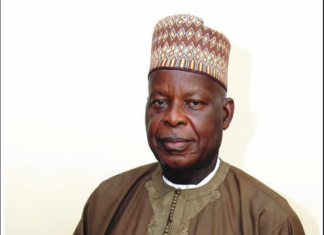The haste with which the seventh Senate passed 46 bills within 10 minutes on Wednesday, June 3 is an issue that will haunt the legislature for a long time.
Though the senators who passed the bill are gone, with some returning, the action has gravely impacted on the reputation of the lawmakers that appeared to have done commendable work in the past four years.
We commend, for instance, the bills for Occupational Safety and Health, Pension Reform Amendment, Same Sex Marriage (Prohibition), Discrimination Against Persons With Disabilities (Prohibition), Terrorism (Prevention) and Proceeds of Crime, which they had passed.
But we are yet to see the need for the urgency behind last Wednesday’s action.
The procedure for lawmaking stipulates that a bill must pass through three stages – first reading, second reading, and third reading – before it can be passed.
However, the seventh Senate received the bills from the House of Representatives and passed them without following the rules.
The explanation by former Chairman, Senate Committee on Rules and Business, Ita Enang, who moved the motion for the passage, was that it was necessary for the Senate to pass the bills because similar bills had been sent to the House of Representatives for passage by the Upper Chamber.
He added that if the Senate failed to pass the bills as sent by the House, the bills equally sent to the House by the Lower Chamber would suffer a similar fate, submitting that by “mutual consent and legislative reciprocity, the House of Representatives had adopted the same special procedures and passed such bills passed by the Senate and transmitted to her for concurrence.”
The second argument was that some money had been spent by lawmakers to pass the bills separately by each Chamber, therefore, it would amount to a waste of resources if the legislative year ended on Thursday, June and all the laws pending were scrapped to be restarted from scratch by the eighth National Assembly (NASS).
So, to cut cost, it was necessary to pass all the 46 bills in one fell swoop without reading one word of any bill but relying solely on the predilections of the House of Representatives.
These arguments cannot stand basic the test of scrutiny and analysis. That the lawmakers could ever slam any shoddy legislation on the electorate, for whatever explanation, is an exercise we find unacceptable in a democracy.
What the senators did was sheer dereliction of duty that cannot be justified.
The senators who acceded to the action need to be reminded that in a democracy, the legislature is, perhaps, the most outstanding arm of the government compared to the executive and the judiciary.
This is not essentially because the legislature is more important than others. It is rather because it is the existence of the legislature that affirms the true practice of democracy as against autocracy, dictatorship and other forms of government.
In addition, it is the lawmakers that are directly in contact with the electorate in their constituencies. It thus behoves them to make laws for the good governance of the country.
This is why lawmaking is a serious business that cannot be sacrificed on the altar of any personal interest or political expediency. We believe, strongly, that adherence to due process is indispensable in passing bills by legislators.
The hurried action, coming from the Senate that is supposed to act as the stabilising voice in the NASS, makes it more intriguing.
The lawmakers had all the time in four years to pass as many laws as they could. If they had stuck to their primary duty, and maintained the minimum seating of 181 days in a year – rather than recesses, oversight visits which often raised questions on the actual intentions – they could have finished passing all these bills the normal way.
This is an aberration, especially as the consequence of 46 hurried laws on governance and on the electorate may impact negatively on the other 77 good laws they made in the past four years.
A major issue which the obviously faulty step by the Senate has resurrected is perhaps the debate on the quality of politicians elected to the various lawmaking houses, which many argue is below standard. This, on its own, is a fall back to an electoral process that is far from standard practice.
In a system where some lawmakers and indeed other elected office holders attain their positions not by popular choice but by imposition, this is the type of sloppiness that results.
The lesson for the electorate, therefore, is to insist on electing credible, quality lawmakers that can stand the rigours of painstaking legislative processes to represent them.
The media and civil society organisations also have a role in this task by expanding the scope and depth of voter education to ensure that only quality lawmakers are elected to the federal and assemblies.
Lawmaking is a serious business and should not be reduced to an exercise for bench-warmers who go to assemblies – federal, state, and council – with the sole purpose of making money.
The eighth NASS should avoid the faulty path of its predecessor and approach lawmaking with the seriousness it deserves.
We also suggest that President Muhammadu Buhari should not give assent to the hurriedly passed 46 bills until they are thoroughly scrutinised.













